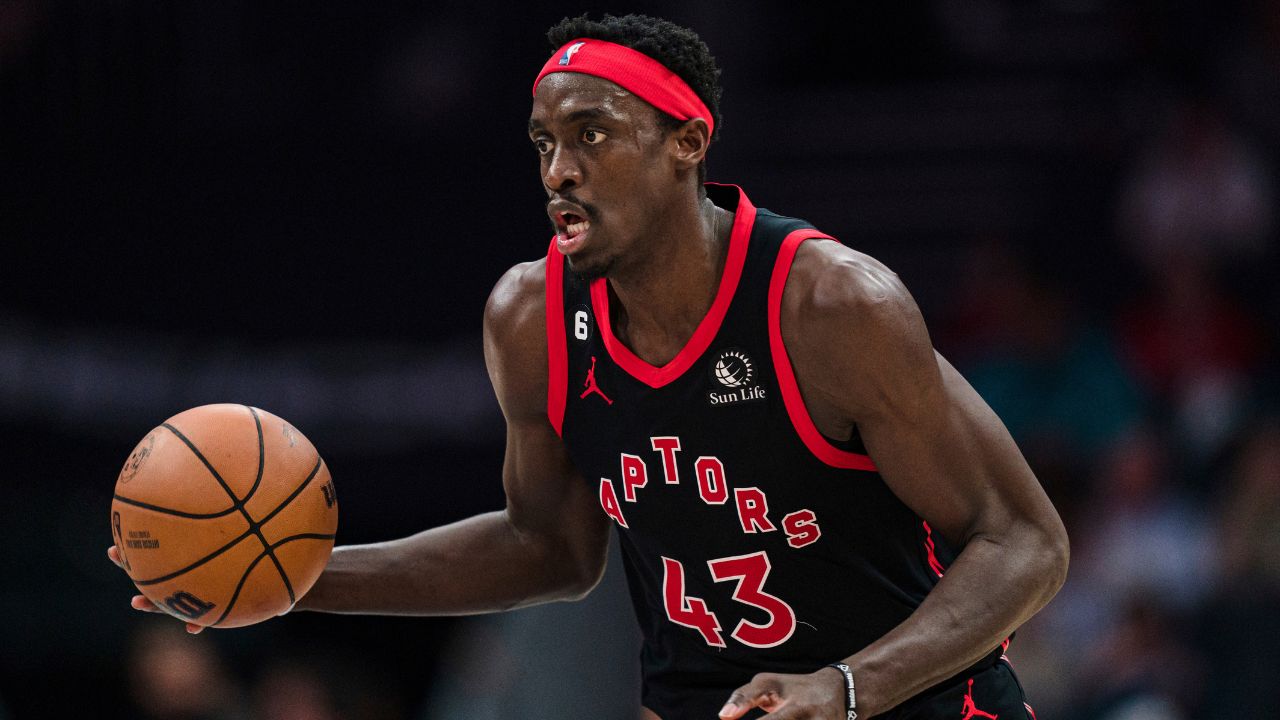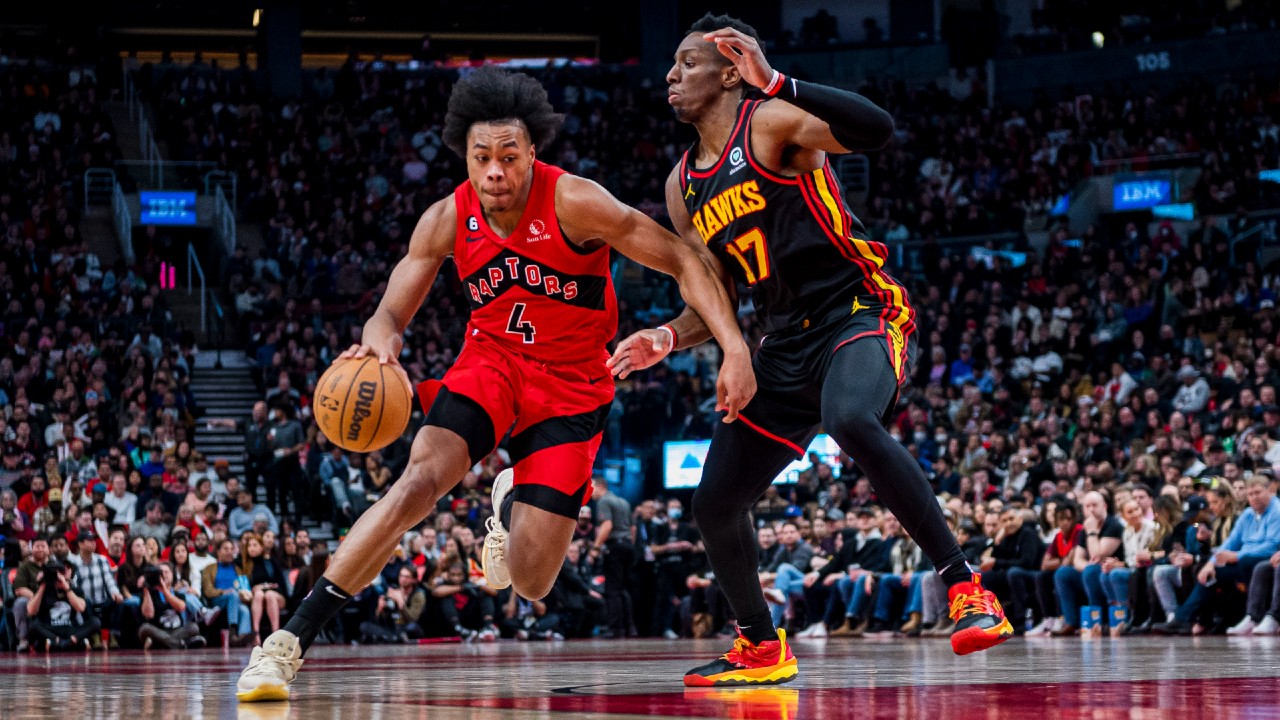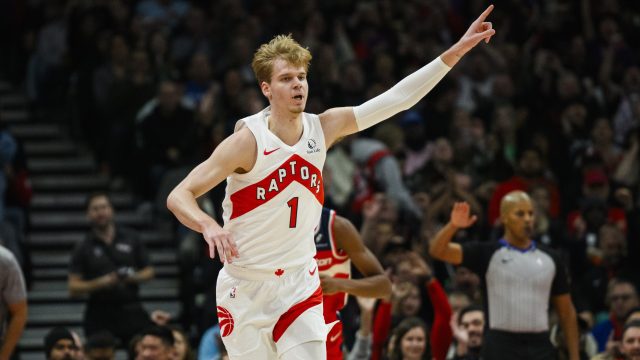
TORONTO — Ever so slowly, the Toronto Raptors are pulling themselves out of the muck they seemed to be mired in on the offensive end in the early part of the season.
As they get set to head out for a quick two-game road trip starting in Cleveland on Sunday followed by a visit to Brooklyn on Tuesday — both teams that the Raptors will likely have to grapple with when it comes to qualifying for the playoffs or play-in tournament — they can hit the road with some good feels.
Toronto is 3-1 in their past four games and is averaging nearly 132 points in the three wins. While the Raptors have rated well for ‘potential assists’ all season, their actual assists — the ones that translate into buckets — have been climbing also, as they’ve averaged 34 assists in those wins.
But the positive trends go back further. Toronto started the season 2-4 and with most of their challenges coming on the offensive end as they were averaging just 106.6 points per 100 possessions — which was 23rd overall — and were last in the NBA in half-court offensive efficiency.
Since then, they are 6-4 and averaging 115.3/100 which is 12th overall in that stretch. And while they aren’t yet a half-court juggernaut, they have bumped themselves up to 25th overall for the season and 17th for the past 10 games.
Passing — which has been one of the cornerstones for the more egalitarian approach to offence that Raptors head coach Darko Rajakovic has been trying to implement — has translated into scoring with the Raptors ranking second in the league with 28.7 assists per game.
“It’s like the way we play, moving the ball and it’s like all the assists comes from like, really different ways,” said Raptors forward Pascal Siakam, who is averaging 5.6 assists per 36 minutes, tying his career high and making him one of six Raptors regulars averaging 3.5 assists or better on a per/36 basis compared to three last season.
“You know, it’s not just like, ‘Oh, I’m passing the ball’. It’s playing fast and advancing the ball so you have to take one dribble and get to the rim and that’s an assist, or like, from the elbow with Jakob (Poeltl) making plays and passing out to guys. There’s just different ways to have an opportunity to have assists, and I think that our cutting game has got to continue to increase and get better, and I think the assists (are) going to go even more once you start cutting even more than what we’re doing right now.”
Rajakovic would agree.
“(We have) a lot of stuff (to improve),” he said after the Raptors recorded 32 assists and 121 points in their win over Chicago on Friday night. “I think, reads, angles of screens, how to read different coverages that defences are throwing at us … how to play against switches, there is a lot of for us to continue learning…”
What’s interesting is that Toronto’s offensive uptick hasn’t been due to a hot streak from the three-point line or even a high volume of three-point shooting. Toronto is 21st in the NBA in the percentage of their points scored from the three-point line and 25th in three-point field goal percentage overall.
As an aside, Rookie Gradey Dick — who long-term is projected to be someone who can help the spacing-challenged Raptors in this area — has been off to an abysmal start (27 per cent from the floor and 24.4 per cent from three and has been assigned to the Raptors G-League team for a couple of games to get back on track). He was 1-of-12 and 0-of-6 from three in a Raptors 905 loss on Saturday afternoon. The soonest he’s expected to rejoin the big team will be Wednesday when the Raptors host the Phoenix Suns.
But in the bigger picture, the Raptors have certainly shown the ability to adapt on the fly. One of their largest areas of improvement since the start of the season has been defensive rebounding. They were 27th in defensive rebounding percentage in their first six games but are second in their past 10 and now are ninth overall.
Turns out finishing off more defensive possessions with rebounds has a positive impact on your offense also.
Toronto is fifth in the NBA in fastbreak points but just 23rd in points scored off turnovers. Last season the Raptors were a dangerous fastbreak team — ranking third overall — but a good chunk of that scoring came from forcing turnovers, where the Raptors ranked first.
The Raptors still aim to be disruptive defensively — they have an internal goal of 32 deflections per game — but put less emphasis on gambling for steals. Perhaps a by-product is better positioning on the defensive glass, but whatever the case, the benefits are showing up on the offensive end also. The Raptors are eighth in pace in their past 10 games, compared with 30th in their first six.
“If you give other teams second chance opportunities, obviously percentage on scoring on those is high so I think once we secure the rebound, we know how we are in transition as a team,” said Siakam. “We have athletes and we can be one of the best in the league at doing that. So we got to secure the rebound for that, and I think the guys responded. It was pretty bad in the beginning, but we’re getting better.
There was no magic formula. Just attention to detail:
“It was just like, there were some games there where for two or three possessions in a row we can’t get a rebound,” said Siakam. “But I think that guys are being more conscious of it and I think just putting emphasis on it and just making the effort.”
The test for Toronto will come when they face some of the NBA’s better defences. For all the positive progress, it’s probably not a coincidence that the average defensive rank of the Raptors’ opponents in their past 10 games is 18th, and that includes two games against Boston who rank fourth defensively and one against Orlando who rank second. The Raptors lost all three of those games and averaged just 104.4 points/100 possessions. For reference, the Portland Trail Blazers bottom-rated offence averages 105.2 points/100.
Against the other seven opponents who ranked between 20th and 30th in defensive rating, the Raptors averaged 121.9 points/100, which would be good for second overall if that was Toronto’s mark for a full season.
Where the Raptors really stand as an offensive team is still an open question. At the very least, they’ve demonstrated a commitment to a style of play and the ability to make it work and that they are capable of taking advantage of weak defensive teams.
Still, the Cavaliers — who led the NBA in defensive rating a season ago — are 15th this season and should provide a good measuring stick for a Raptors offence that is far from perfect but is showing real signs of life after a concerning start.








